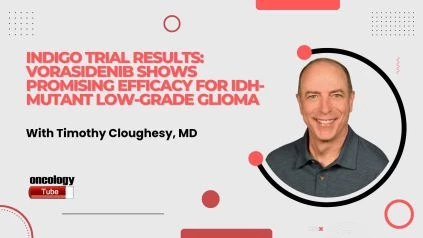Dr. Timothy Cloughesy, a prominent physician from UCLA Health, conducted the INDIGO clinical trial to evaluate the efficacy of Vorasidenib, an IDH inhibitor, in patients with IDH mutant low-grade glioma. The primary endpoint of the trial was progression-free survival (PFS). The results of the trial demonstrated a significant difference in PFS between the placebo and treatment groups.
In the placebo group, tumors started to grow significantly within 11 months, while the treatment group experienced a median PFS of 27 months. This stark contrast indicated the effectiveness of Vorasidenib, supported by the P-values and hazard ratios. The trial also underwent an interim analysis, which revealed such promising results that the study was halted prematurely. As a result, patients in the placebo arm were switched to the treatment arm.
Furthermore, the time to next intervention (TTNI) analysis showed that a minority of patients in the Vorasidenib group required a second therapy, whereas the majority of patients in the placebo group did. This highlights the ability of Vorasidenib to delay the need for additional interventions.
Regarding safety, patients reported no significant differences in side effects between Vorasidenib and the placebo. Although some patients exhibited an increase in liver function test results, the majority of abnormalities were reversible or resolved on their own.
The study compared Vorasidenib to the current standard of care, which involved watchful waiting for patients in the placebo arm. The median progression time for patients on watchful waiting was approximately 11 months, whereas those in the Vorasidenib arm experienced a median PFS of 28 months. These findings indicate the potential for Vorasidenib to significantly extend the time before initiating other therapies, such as radiation and chemotherapy.
The trial included patients with various characteristics, such as age, time since surgery, and tumor size. However, no subgroup analysis identified specific patient characteristics or biomarkers that influenced the response to Vorasidenib.
The positive results of the INDIGO trial hold significant implications for the treatment of IDH-mutant diffuse gliomas. Patients, especially young individuals, who desire to delay radiation and chemotherapy may benefit from Vorasidenib. The desire of patients to participate in the study underscores the need for alternative treatment options. Future research may explore the potential benefits of Vorasidenib for different tumor grades and its role in combination therapies.
Moving forward, the next steps involve the development and regulatory process for Vorasidenib, including seeking FDA approval. The strikingly positive data and the clinical benefit observed should facilitate the approval process, providing patients and physicians with access to this beneficial therapy.
In summary, Dr. Cloughesy’s INDIGO trial demonstrated the efficacy of Vorasidenib in prolonging progression-free survival and delaying the need for additional interventions in patients with IDH mutant low-grade glioma. These findings contribute to our understanding of IDH mutations and their significance in glioma progression, highlighting the importance of targeting IDH mutations in these types of tumors.

